Leadership and Management: Roles, Contexts, Approaches, and Theories
VerifiedAdded on 2020/01/23
|6
|1608
|158
Report
AI Summary
This report provides a comprehensive analysis of leadership and management, exploring their distinct roles, contextual applications, and theoretical frameworks. The report begins by comparing the characteristics of leaders and managers, highlighting their different approaches to influencing and directing individuals and organizations. It then delves into the specific roles of managers and leaders in various contexts, demonstrating how their responsibilities and priorities shift based on the situation. The report also examines leadership theories and models, including trait theory and contingency theory, to provide a deeper understanding of leadership styles. Furthermore, the report discusses key approaches to operational management and the roles that leaders and managers play in these approaches, emphasizing the importance of efficiency, quality, and team success. Finally, the report underscores the value of operational management in achieving business objectives, highlighting its impact on organizational success and goal attainment. The report concludes by emphasizing the importance of both effective leadership and management in fostering organizational growth and development, supported by relevant references.
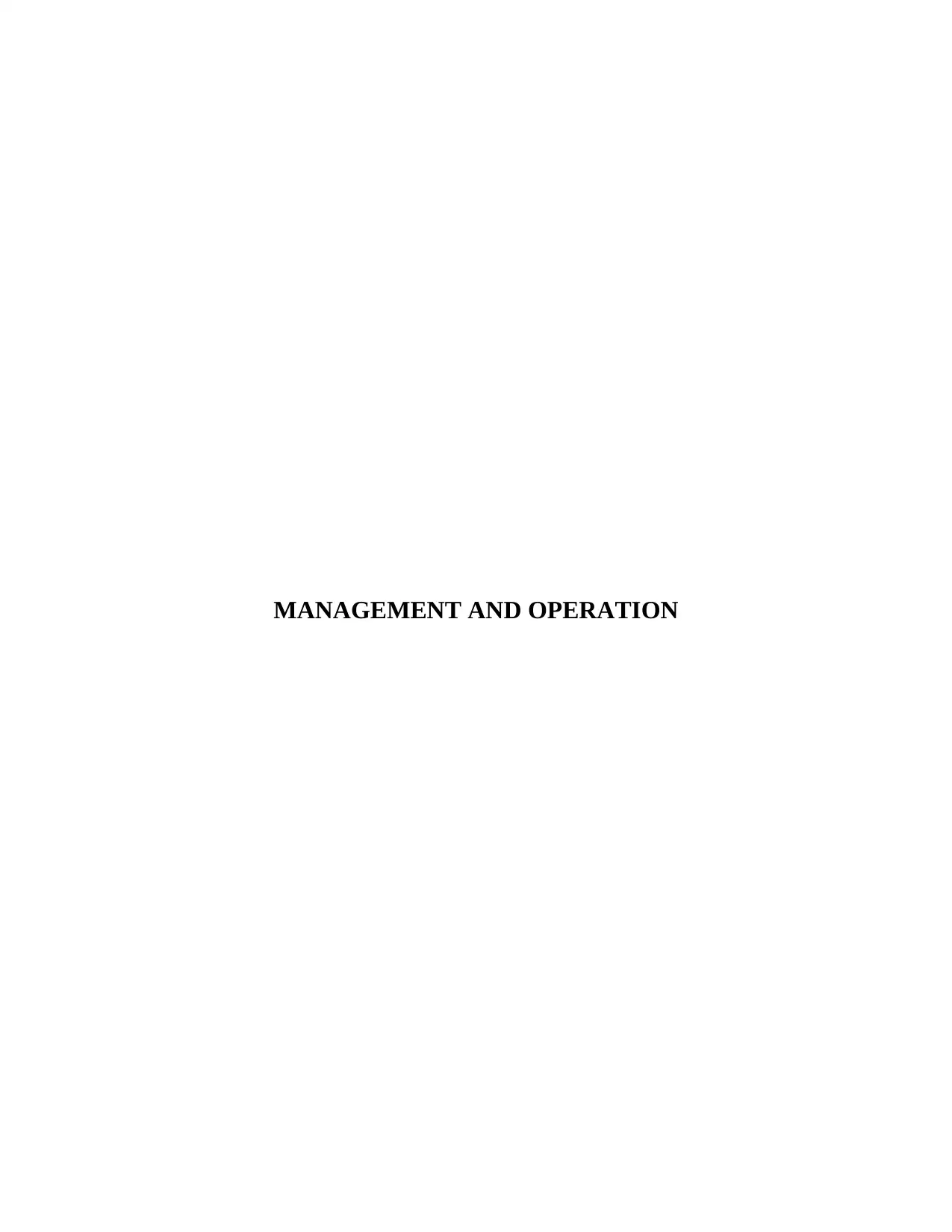
MANAGEMENT AND OPERATION
Paraphrase This Document
Need a fresh take? Get an instant paraphrase of this document with our AI Paraphraser
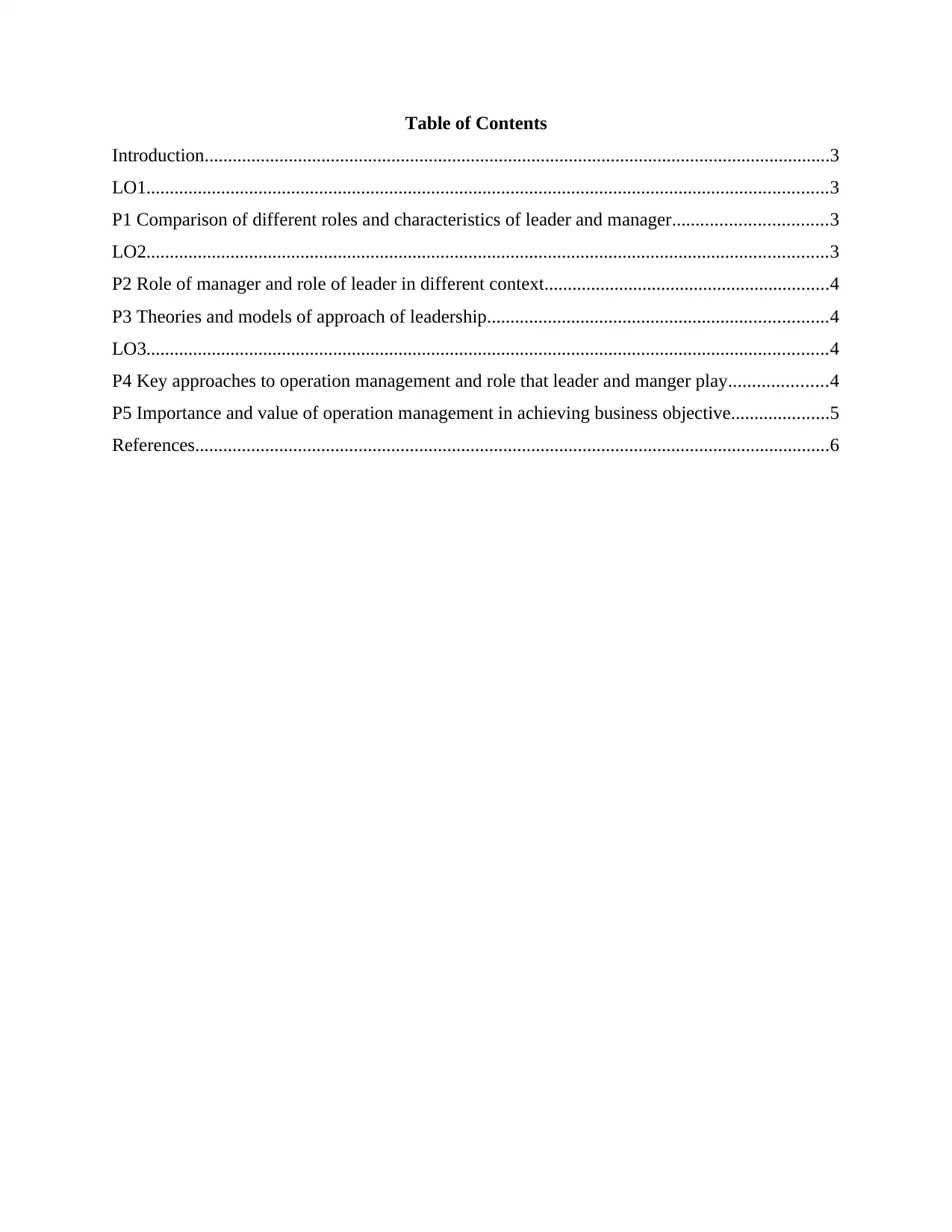
Table of Contents
Introduction......................................................................................................................................3
LO1..................................................................................................................................................3
P1 Comparison of different roles and characteristics of leader and manager.................................3
LO2..................................................................................................................................................3
P2 Role of manager and role of leader in different context.............................................................4
P3 Theories and models of approach of leadership.........................................................................4
LO3..................................................................................................................................................4
P4 Key approaches to operation management and role that leader and manger play.....................4
P5 Importance and value of operation management in achieving business objective.....................5
References........................................................................................................................................6
Introduction......................................................................................................................................3
LO1..................................................................................................................................................3
P1 Comparison of different roles and characteristics of leader and manager.................................3
LO2..................................................................................................................................................3
P2 Role of manager and role of leader in different context.............................................................4
P3 Theories and models of approach of leadership.........................................................................4
LO3..................................................................................................................................................4
P4 Key approaches to operation management and role that leader and manger play.....................4
P5 Importance and value of operation management in achieving business objective.....................5
References........................................................................................................................................6
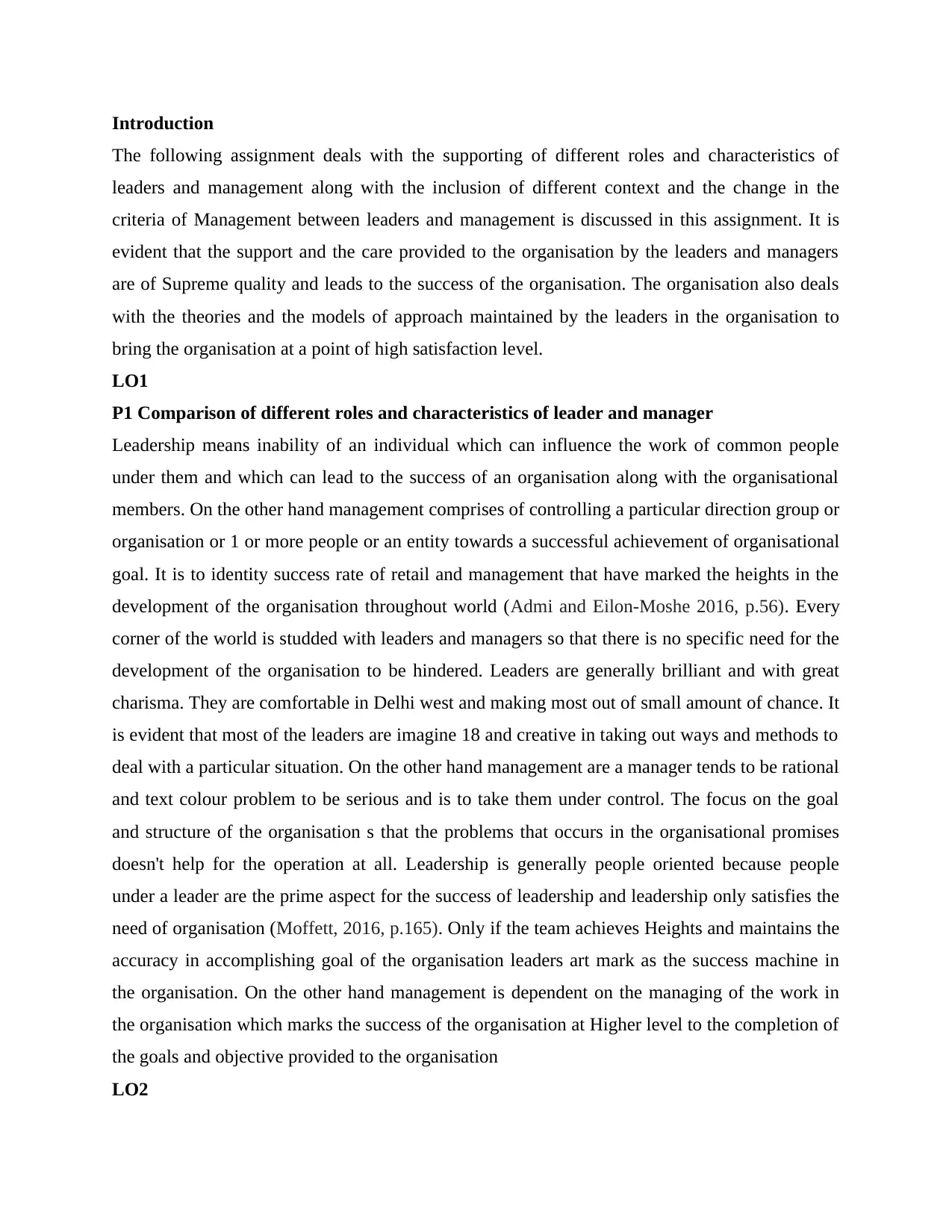
Introduction
The following assignment deals with the supporting of different roles and characteristics of
leaders and management along with the inclusion of different context and the change in the
criteria of Management between leaders and management is discussed in this assignment. It is
evident that the support and the care provided to the organisation by the leaders and managers
are of Supreme quality and leads to the success of the organisation. The organisation also deals
with the theories and the models of approach maintained by the leaders in the organisation to
bring the organisation at a point of high satisfaction level.
LO1
P1 Comparison of different roles and characteristics of leader and manager
Leadership means inability of an individual which can influence the work of common people
under them and which can lead to the success of an organisation along with the organisational
members. On the other hand management comprises of controlling a particular direction group or
organisation or 1 or more people or an entity towards a successful achievement of organisational
goal. It is to identity success rate of retail and management that have marked the heights in the
development of the organisation throughout world (Admi and Eilon-Moshe 2016, p.56). Every
corner of the world is studded with leaders and managers so that there is no specific need for the
development of the organisation to be hindered. Leaders are generally brilliant and with great
charisma. They are comfortable in Delhi west and making most out of small amount of chance. It
is evident that most of the leaders are imagine 18 and creative in taking out ways and methods to
deal with a particular situation. On the other hand management are a manager tends to be rational
and text colour problem to be serious and is to take them under control. The focus on the goal
and structure of the organisation s that the problems that occurs in the organisational promises
doesn't help for the operation at all. Leadership is generally people oriented because people
under a leader are the prime aspect for the success of leadership and leadership only satisfies the
need of organisation (Moffett, 2016, p.165). Only if the team achieves Heights and maintains the
accuracy in accomplishing goal of the organisation leaders art mark as the success machine in
the organisation. On the other hand management is dependent on the managing of the work in
the organisation which marks the success of the organisation at Higher level to the completion of
the goals and objective provided to the organisation
LO2
The following assignment deals with the supporting of different roles and characteristics of
leaders and management along with the inclusion of different context and the change in the
criteria of Management between leaders and management is discussed in this assignment. It is
evident that the support and the care provided to the organisation by the leaders and managers
are of Supreme quality and leads to the success of the organisation. The organisation also deals
with the theories and the models of approach maintained by the leaders in the organisation to
bring the organisation at a point of high satisfaction level.
LO1
P1 Comparison of different roles and characteristics of leader and manager
Leadership means inability of an individual which can influence the work of common people
under them and which can lead to the success of an organisation along with the organisational
members. On the other hand management comprises of controlling a particular direction group or
organisation or 1 or more people or an entity towards a successful achievement of organisational
goal. It is to identity success rate of retail and management that have marked the heights in the
development of the organisation throughout world (Admi and Eilon-Moshe 2016, p.56). Every
corner of the world is studded with leaders and managers so that there is no specific need for the
development of the organisation to be hindered. Leaders are generally brilliant and with great
charisma. They are comfortable in Delhi west and making most out of small amount of chance. It
is evident that most of the leaders are imagine 18 and creative in taking out ways and methods to
deal with a particular situation. On the other hand management are a manager tends to be rational
and text colour problem to be serious and is to take them under control. The focus on the goal
and structure of the organisation s that the problems that occurs in the organisational promises
doesn't help for the operation at all. Leadership is generally people oriented because people
under a leader are the prime aspect for the success of leadership and leadership only satisfies the
need of organisation (Moffett, 2016, p.165). Only if the team achieves Heights and maintains the
accuracy in accomplishing goal of the organisation leaders art mark as the success machine in
the organisation. On the other hand management is dependent on the managing of the work in
the organisation which marks the success of the organisation at Higher level to the completion of
the goals and objective provided to the organisation
LO2
⊘ This is a preview!⊘
Do you want full access?
Subscribe today to unlock all pages.

Trusted by 1+ million students worldwide
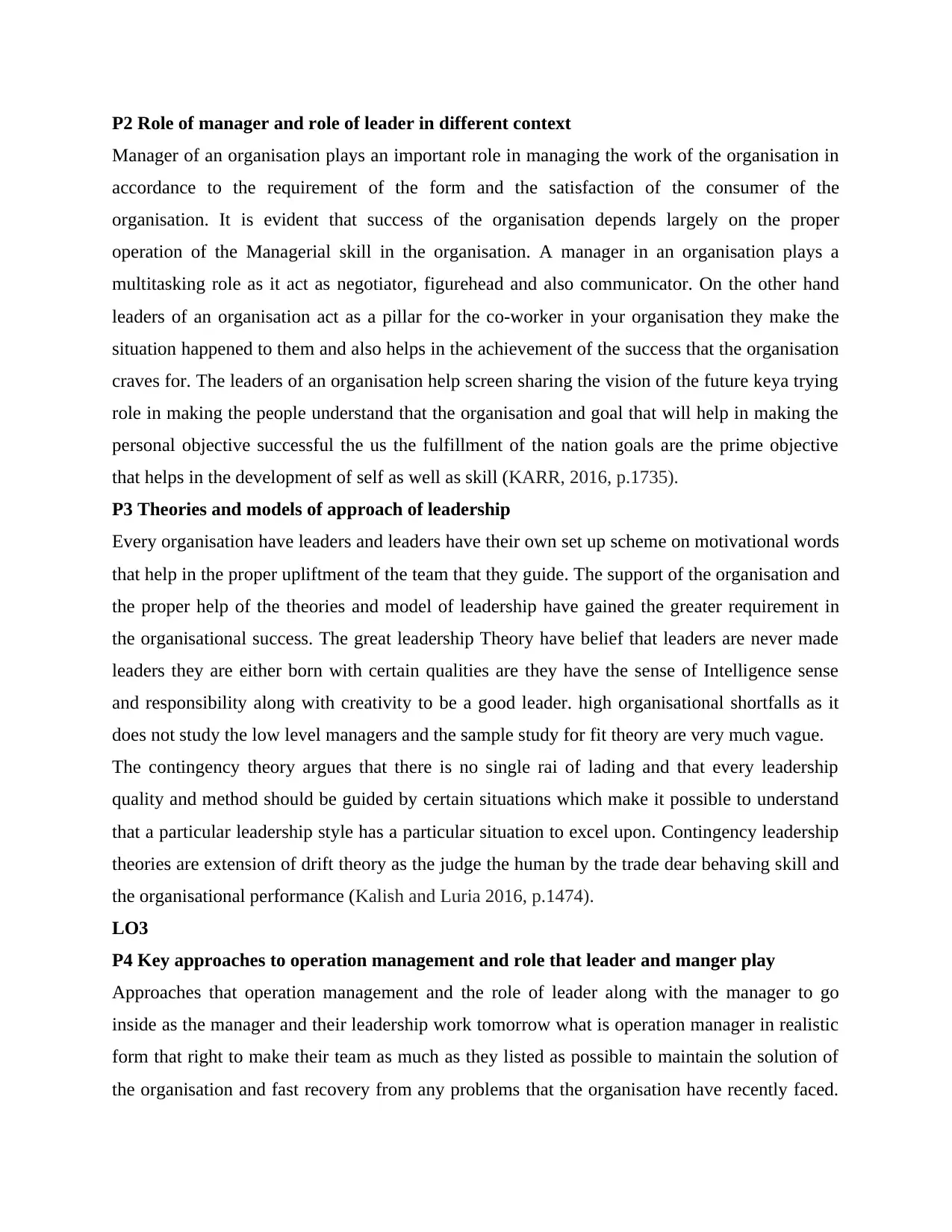
P2 Role of manager and role of leader in different context
Manager of an organisation plays an important role in managing the work of the organisation in
accordance to the requirement of the form and the satisfaction of the consumer of the
organisation. It is evident that success of the organisation depends largely on the proper
operation of the Managerial skill in the organisation. A manager in an organisation plays a
multitasking role as it act as negotiator, figurehead and also communicator. On the other hand
leaders of an organisation act as a pillar for the co-worker in your organisation they make the
situation happened to them and also helps in the achievement of the success that the organisation
craves for. The leaders of an organisation help screen sharing the vision of the future keya trying
role in making the people understand that the organisation and goal that will help in making the
personal objective successful the us the fulfillment of the nation goals are the prime objective
that helps in the development of self as well as skill (KARR, 2016, p.1735).
P3 Theories and models of approach of leadership
Every organisation have leaders and leaders have their own set up scheme on motivational words
that help in the proper upliftment of the team that they guide. The support of the organisation and
the proper help of the theories and model of leadership have gained the greater requirement in
the organisational success. The great leadership Theory have belief that leaders are never made
leaders they are either born with certain qualities are they have the sense of Intelligence sense
and responsibility along with creativity to be a good leader. high organisational shortfalls as it
does not study the low level managers and the sample study for fit theory are very much vague.
The contingency theory argues that there is no single rai of lading and that every leadership
quality and method should be guided by certain situations which make it possible to understand
that a particular leadership style has a particular situation to excel upon. Contingency leadership
theories are extension of drift theory as the judge the human by the trade dear behaving skill and
the organisational performance (Kalish and Luria 2016, p.1474).
LO3
P4 Key approaches to operation management and role that leader and manger play
Approaches that operation management and the role of leader along with the manager to go
inside as the manager and their leadership work tomorrow what is operation manager in realistic
form that right to make their team as much as they listed as possible to maintain the solution of
the organisation and fast recovery from any problems that the organisation have recently faced.
Manager of an organisation plays an important role in managing the work of the organisation in
accordance to the requirement of the form and the satisfaction of the consumer of the
organisation. It is evident that success of the organisation depends largely on the proper
operation of the Managerial skill in the organisation. A manager in an organisation plays a
multitasking role as it act as negotiator, figurehead and also communicator. On the other hand
leaders of an organisation act as a pillar for the co-worker in your organisation they make the
situation happened to them and also helps in the achievement of the success that the organisation
craves for. The leaders of an organisation help screen sharing the vision of the future keya trying
role in making the people understand that the organisation and goal that will help in making the
personal objective successful the us the fulfillment of the nation goals are the prime objective
that helps in the development of self as well as skill (KARR, 2016, p.1735).
P3 Theories and models of approach of leadership
Every organisation have leaders and leaders have their own set up scheme on motivational words
that help in the proper upliftment of the team that they guide. The support of the organisation and
the proper help of the theories and model of leadership have gained the greater requirement in
the organisational success. The great leadership Theory have belief that leaders are never made
leaders they are either born with certain qualities are they have the sense of Intelligence sense
and responsibility along with creativity to be a good leader. high organisational shortfalls as it
does not study the low level managers and the sample study for fit theory are very much vague.
The contingency theory argues that there is no single rai of lading and that every leadership
quality and method should be guided by certain situations which make it possible to understand
that a particular leadership style has a particular situation to excel upon. Contingency leadership
theories are extension of drift theory as the judge the human by the trade dear behaving skill and
the organisational performance (Kalish and Luria 2016, p.1474).
LO3
P4 Key approaches to operation management and role that leader and manger play
Approaches that operation management and the role of leader along with the manager to go
inside as the manager and their leadership work tomorrow what is operation manager in realistic
form that right to make their team as much as they listed as possible to maintain the solution of
the organisation and fast recovery from any problems that the organisation have recently faced.
Paraphrase This Document
Need a fresh take? Get an instant paraphrase of this document with our AI Paraphraser
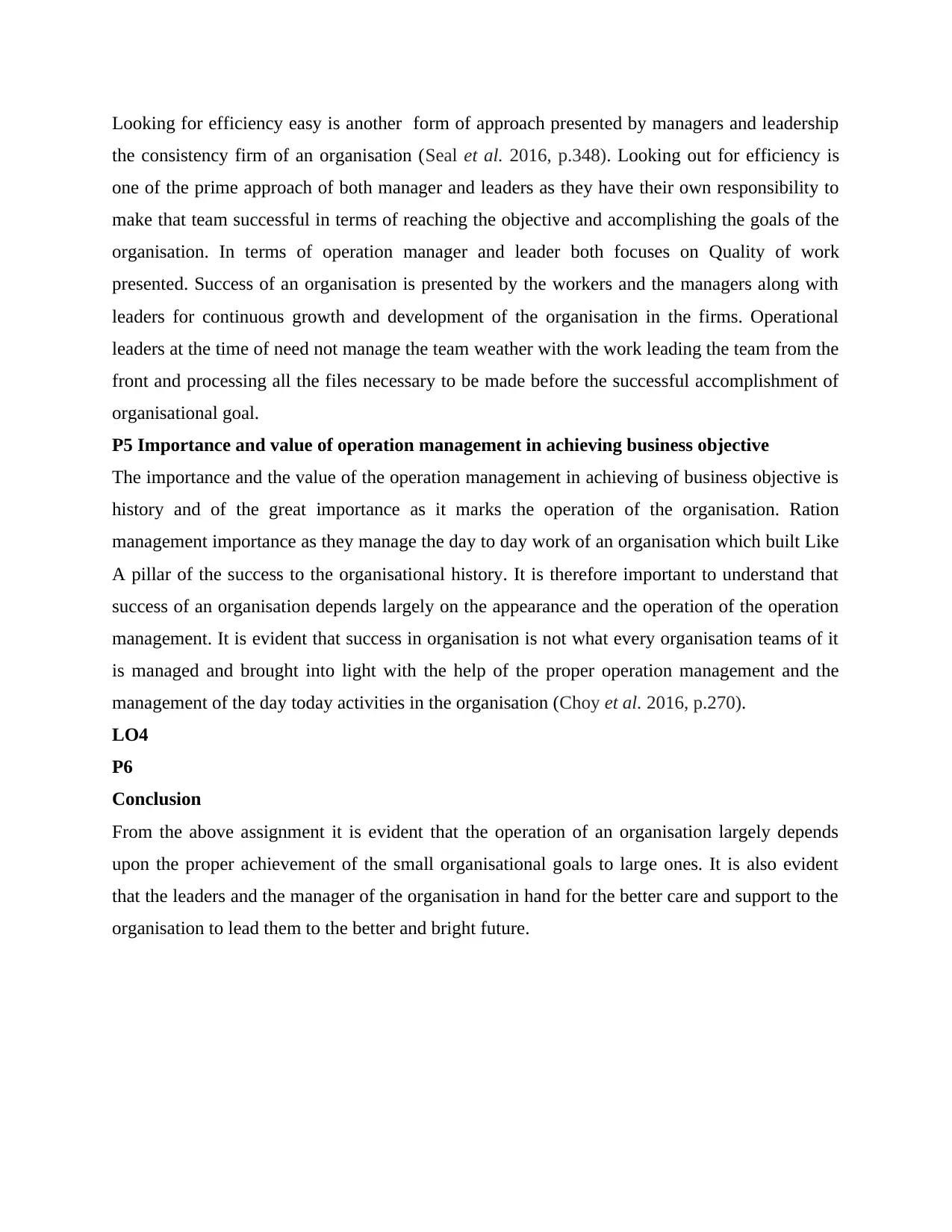
Looking for efficiency easy is another form of approach presented by managers and leadership
the consistency firm of an organisation (Seal et al. 2016, p.348). Looking out for efficiency is
one of the prime approach of both manager and leaders as they have their own responsibility to
make that team successful in terms of reaching the objective and accomplishing the goals of the
organisation. In terms of operation manager and leader both focuses on Quality of work
presented. Success of an organisation is presented by the workers and the managers along with
leaders for continuous growth and development of the organisation in the firms. Operational
leaders at the time of need not manage the team weather with the work leading the team from the
front and processing all the files necessary to be made before the successful accomplishment of
organisational goal.
P5 Importance and value of operation management in achieving business objective
The importance and the value of the operation management in achieving of business objective is
history and of the great importance as it marks the operation of the organisation. Ration
management importance as they manage the day to day work of an organisation which built Like
A pillar of the success to the organisational history. It is therefore important to understand that
success of an organisation depends largely on the appearance and the operation of the operation
management. It is evident that success in organisation is not what every organisation teams of it
is managed and brought into light with the help of the proper operation management and the
management of the day today activities in the organisation (Choy et al. 2016, p.270).
LO4
P6
Conclusion
From the above assignment it is evident that the operation of an organisation largely depends
upon the proper achievement of the small organisational goals to large ones. It is also evident
that the leaders and the manager of the organisation in hand for the better care and support to the
organisation to lead them to the better and bright future.
the consistency firm of an organisation (Seal et al. 2016, p.348). Looking out for efficiency is
one of the prime approach of both manager and leaders as they have their own responsibility to
make that team successful in terms of reaching the objective and accomplishing the goals of the
organisation. In terms of operation manager and leader both focuses on Quality of work
presented. Success of an organisation is presented by the workers and the managers along with
leaders for continuous growth and development of the organisation in the firms. Operational
leaders at the time of need not manage the team weather with the work leading the team from the
front and processing all the files necessary to be made before the successful accomplishment of
organisational goal.
P5 Importance and value of operation management in achieving business objective
The importance and the value of the operation management in achieving of business objective is
history and of the great importance as it marks the operation of the organisation. Ration
management importance as they manage the day to day work of an organisation which built Like
A pillar of the success to the organisational history. It is therefore important to understand that
success of an organisation depends largely on the appearance and the operation of the operation
management. It is evident that success in organisation is not what every organisation teams of it
is managed and brought into light with the help of the proper operation management and the
management of the day today activities in the organisation (Choy et al. 2016, p.270).
LO4
P6
Conclusion
From the above assignment it is evident that the operation of an organisation largely depends
upon the proper achievement of the small organisational goals to large ones. It is also evident
that the leaders and the manager of the organisation in hand for the better care and support to the
organisation to lead them to the better and bright future.
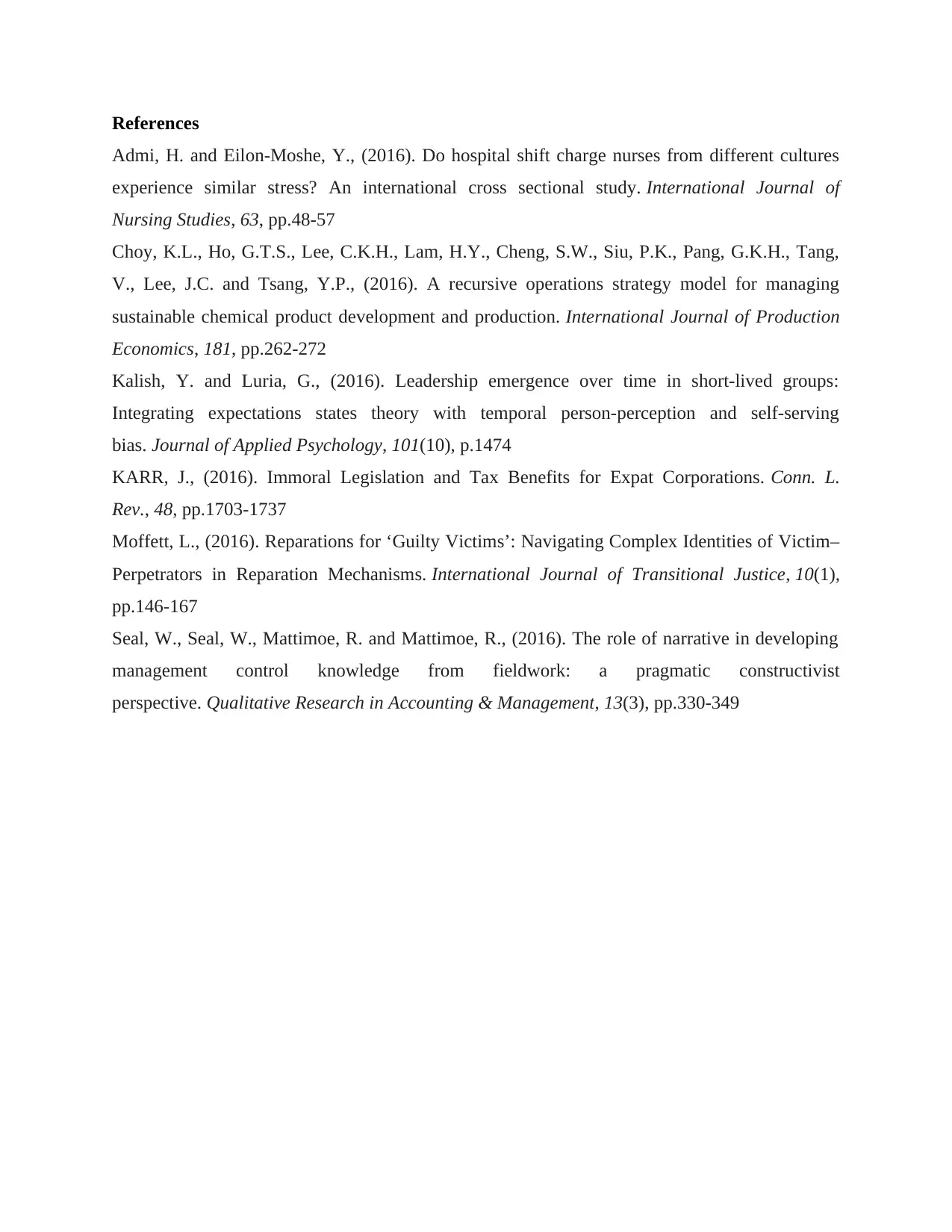
References
Admi, H. and Eilon-Moshe, Y., (2016). Do hospital shift charge nurses from different cultures
experience similar stress? An international cross sectional study. International Journal of
Nursing Studies, 63, pp.48-57
Choy, K.L., Ho, G.T.S., Lee, C.K.H., Lam, H.Y., Cheng, S.W., Siu, P.K., Pang, G.K.H., Tang,
V., Lee, J.C. and Tsang, Y.P., (2016). A recursive operations strategy model for managing
sustainable chemical product development and production. International Journal of Production
Economics, 181, pp.262-272
Kalish, Y. and Luria, G., (2016). Leadership emergence over time in short-lived groups:
Integrating expectations states theory with temporal person-perception and self-serving
bias. Journal of Applied Psychology, 101(10), p.1474
KARR, J., (2016). Immoral Legislation and Tax Benefits for Expat Corporations. Conn. L.
Rev., 48, pp.1703-1737
Moffett, L., (2016). Reparations for ‘Guilty Victims’: Navigating Complex Identities of Victim–
Perpetrators in Reparation Mechanisms. International Journal of Transitional Justice, 10(1),
pp.146-167
Seal, W., Seal, W., Mattimoe, R. and Mattimoe, R., (2016). The role of narrative in developing
management control knowledge from fieldwork: a pragmatic constructivist
perspective. Qualitative Research in Accounting & Management, 13(3), pp.330-349
Admi, H. and Eilon-Moshe, Y., (2016). Do hospital shift charge nurses from different cultures
experience similar stress? An international cross sectional study. International Journal of
Nursing Studies, 63, pp.48-57
Choy, K.L., Ho, G.T.S., Lee, C.K.H., Lam, H.Y., Cheng, S.W., Siu, P.K., Pang, G.K.H., Tang,
V., Lee, J.C. and Tsang, Y.P., (2016). A recursive operations strategy model for managing
sustainable chemical product development and production. International Journal of Production
Economics, 181, pp.262-272
Kalish, Y. and Luria, G., (2016). Leadership emergence over time in short-lived groups:
Integrating expectations states theory with temporal person-perception and self-serving
bias. Journal of Applied Psychology, 101(10), p.1474
KARR, J., (2016). Immoral Legislation and Tax Benefits for Expat Corporations. Conn. L.
Rev., 48, pp.1703-1737
Moffett, L., (2016). Reparations for ‘Guilty Victims’: Navigating Complex Identities of Victim–
Perpetrators in Reparation Mechanisms. International Journal of Transitional Justice, 10(1),
pp.146-167
Seal, W., Seal, W., Mattimoe, R. and Mattimoe, R., (2016). The role of narrative in developing
management control knowledge from fieldwork: a pragmatic constructivist
perspective. Qualitative Research in Accounting & Management, 13(3), pp.330-349
⊘ This is a preview!⊘
Do you want full access?
Subscribe today to unlock all pages.

Trusted by 1+ million students worldwide
1 out of 6
Related Documents
Your All-in-One AI-Powered Toolkit for Academic Success.
+13062052269
info@desklib.com
Available 24*7 on WhatsApp / Email
![[object Object]](/_next/static/media/star-bottom.7253800d.svg)
Unlock your academic potential
Copyright © 2020–2026 A2Z Services. All Rights Reserved. Developed and managed by ZUCOL.





